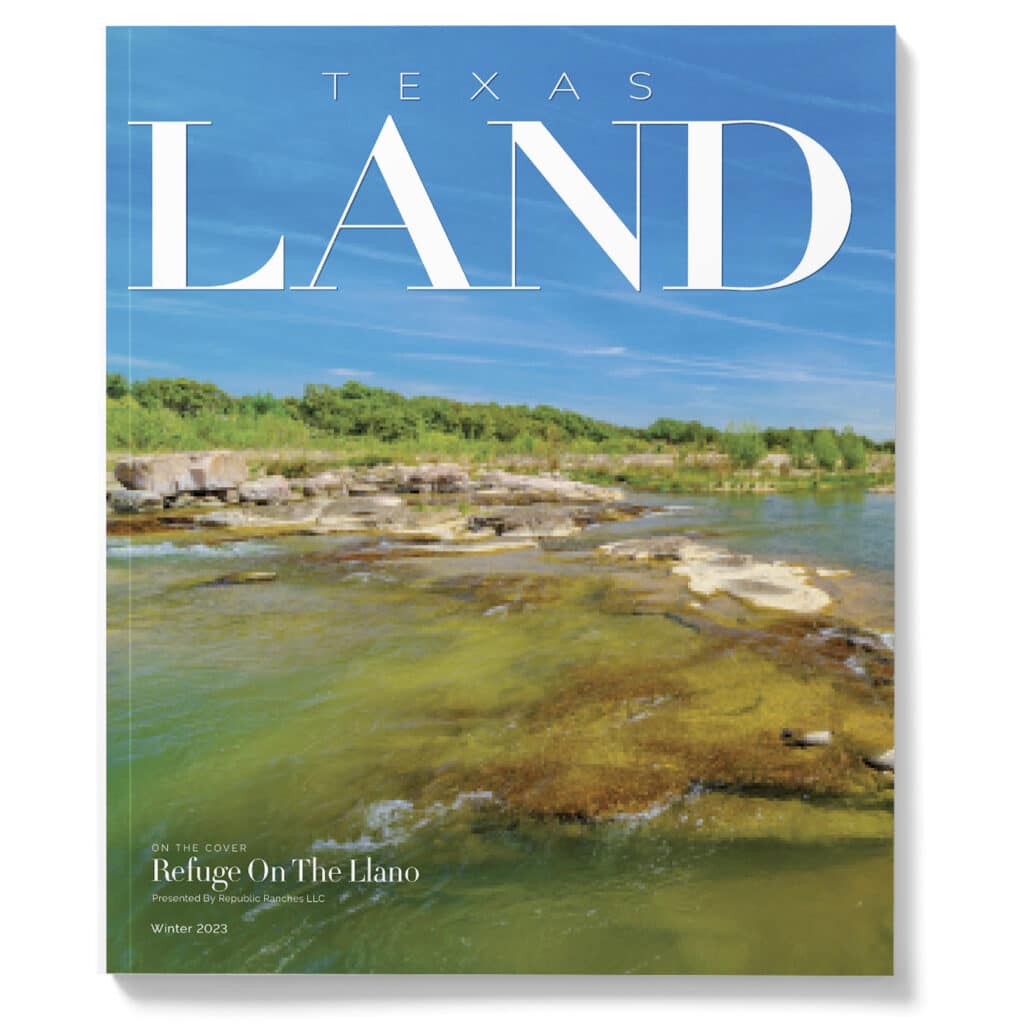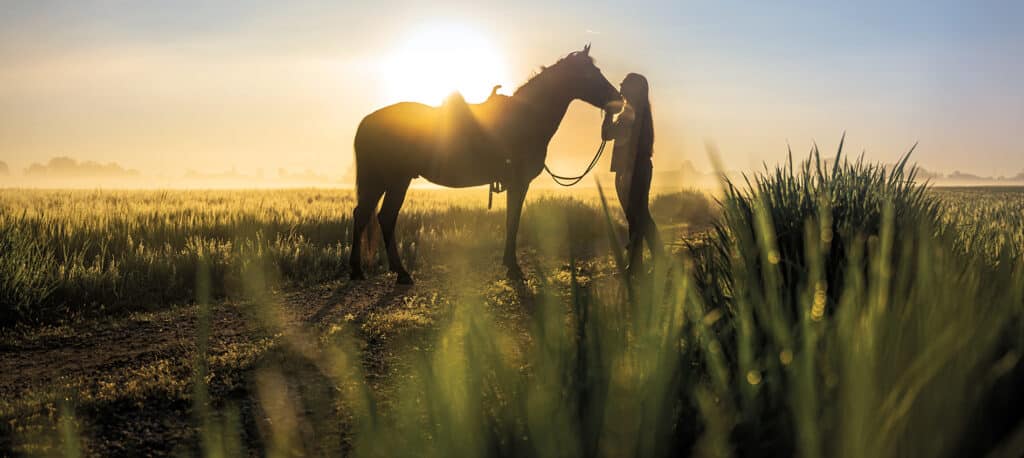
This article is featured in the Winter 2023 issue of Texas LAND magazine. Click here to find out more.
What was the impetus for creating TREAD?
The Texas Real Estate Advocacy & Defense (TREAD) Coalition was created in 2017 by some land attorneys who were litigating issues they thought could be addressed by landowner education and resources as well as policy changes in the legislature.
Describe the philosophy/approach that the TREAD Coalition takes when advocating for landowners and rural communities?
At TREAD Coalition, we take a holistic approach to rural communities. When TREAD was formed, the focus was mostly on landowners in rural Texas. We have broadened our scope to include anyone who lives in a rural community. Why? Because 83 percent of Texas is rural and there was an important constituency missing.
Anyone who lives in a rural community feels the impacts of land fragmentation and suburban encroachment. Our goal is to streamline processes and promote smart growth approaches that allow rural communities to thrive, keep working lands working and conserve land and resources for future generations.
What is TREAD’s overarching mission?
TREAD Coalition is a member organization that advocates for landowners and rural communities at the state and local levels. We provide education, resources and policy solutions to protect private property rights.
Why are the benefits of the coalition approach and why is that the most effective way for achieving TREAD’s objectives?
We work with peer organizations such as the Texas Wildlife Association, Texas Farm Bureau and Texas & Southwestern Cattle Raisers on issues where there is overlap and intersection, but we recognize that rural Texas and rural Texans are changing. While TREAD members are active farmers and ranchers, they also are schoolteachers, doctors, accountants, lawyers, and small business owners. Their concerns are different, and TREAD is the coalition that advocates for them as well.
We look at the cumulative land use trends and how they impact rural Texas. For example, land fragmentation for commercial development or rooftops means more wear and tear on the land in addition to more straws in the ground siphoning off water.
This type of growth impacts rural Texas directly and indirectly. Renewable energy infrastructure including carbon and hydrogen pipelines and battery storage facilities is leaving its footprint across rural Texas. These additions to a community change land values and in some cases historic use.
Our goal is to bring industry experts and researchers together to evaluate our state’s rapid growth and identify best practices that can be implemented to encourage conservation and sustainability practices at the same time we protect private property rights and free enterprise.
Our goal is to bring industry experts and researchers together to evaluate our state’s rapid growth and identify best practices that can be implemented to encourage conservation and sustainability practices at the same time we protect private property rights and free enterprise.
As you look at Texas, what are the top five challenges facing the state and by extension rural landowners?
Landowners struggle with the rise in land cost, property taxes, access to water and the intergenerational transfer of wealth and land. Many landowners are looking to sell their land because it’s no longer affordable to keep it or try to hold on to it for future generations. Additionally, landowners are looking at new revenue generators like carbon sequestration, renewables, and lithium mining to hold onto their land for succeeding generations.
As a property rights organization, we advocate for landowners doing what they wish with their land, but we also educate them on how to be a stakeholder in any agreement. We help them identify what protections to put in place that will further their land stewardship and prevent them from being taken advantage of.
Why do the state’s challenges of having enough water, food and other nature-based products as well as their solutions rest so heavily on rural Texas, its communities and landowners?
Urban centers are consumers, and their citizenry is not tied to the land. Navigating that disconnect is becoming an increasing struggle. With lack of planning and oversight in our state, Texas lands are being used in ways that can have long-term implications if not offset by safeguards and best practices.
Green spaces provide fresh air, food, fiber and water to the millions of Texans in this state and those resources come from rural Texas. Although we have 171 million acres of land in this state, much of our farm and ranch land is being converted at a rapid rate of 1,000 acres a day to development and energy infrastructure. Much of this development is fragmenting rural lands, which further strains its natural productivity.
As an advocate for landowners and rural Texas, what is the most difficult part of getting the important messages across in the Legislature and in regulatory agencies?
There is little or no oversight with many industries in Texas, and we are beginning to see the results of this haphazard sprawl with threats to our water supply, wildlife habitat, clean air, food and fiber. There also are tax incentives for certain industries and not others.
The jobs and output provided by farming, ranching, wildlife management and recreational hunting and fishing contribute millions of dollars and thousands of jobs to the state’s economy while conserving natural infrastructure. We don’t incentivize these industries in our state, and we need to level the incentive and regulatory playing field so all industries can compete and provide. Encouraging natural resource-based industries would be the most effective way to have a sustainable economy and conserve resources in our state.
TREAD Coalition is an advocacy organization that works with local and state elected officials on potential policy changes to streamline processes and have more protections in place for working lands, green spaces like parks, water and rural communities overall.
As Texas becomes more and more urban, why is it increasingly important that rural landowners and communities have a collective voice and become active players in the legislative process?
With Texas becoming more urban, the issues change, and legislative representation leans toward urban concerns. As more issues are viewed through an urban lens, it is even more imperative that rural citizens unite and be a part of a coalition that is actively defending private property rights and working to solve the myriad of issues caused by land fragmentation.
We work with peer organizations on sound policy and best practices to promote smart growth and thoughtful land stewardship. TREAD also engages with the various caucuses in the Legislature providing them with data and real-life examples of what’s happening with their constituency so they may influence their peers to protect rural Texas.
How can Texans become involved in TREAD?
TREAD Coalition is a member organization, so joining the Coalition is a great way to become more involved and informed on issues impacting rural Texas. Members have access to online resources and our TREAD Talk programming. Additionally, your involvement helps TREAD advocate for private property rights and be your voice at the Capitol.
What else do people need to know about TREAD?
TREAD Coalition defends the rights of landowners and rural Texas. Whether you have a quarter of an acre or 5,000 acres, your rights need to be protected and your concerns represented. As our state grows and changes, we must be proactive with addressing our infrastructure, both natural and man-made, and implementing best practices.
Nature is a crucial infrastructure—our land, rivers, streams and aquifers provide great benefit to Texans, and they must be protected. And your property rights need to be protected as well.
When you evaluate diversifying revenue streams, sign a lease agreement for a corporate project, sell part of your land or face condemnation, you have rights and need to be treated like the stakeholder you are. TREAD works tirelessly to insure that.
Find more information about TREAD Coalition here.

